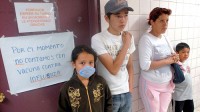A pandemic by any other name? Swine Flu spreads quickly across globe.
news, politics, science 1 Comment » When I arrived at the gym this morning I jokingly asked if anyone had been to Mexico recently… But I was really only half joking. My trainer promptly told me not panic and keep my hands washed as I jumped onto the treadmill.
When I arrived at the gym this morning I jokingly asked if anyone had been to Mexico recently… But I was really only half joking. My trainer promptly told me not panic and keep my hands washed as I jumped onto the treadmill.
While certainly not in the same league as Ebola or the Spanish Flu, the H1N1 virus—aka the swine flu—is still a killer, with a death toll passing 150, and it’s meteoric spread across the globe has been nothing less than astonishing. Originating in Mexico, the virus has spread as far as Europe and Australia, including over 40 cases here the United States, and that’s only 2 weeks after first documented case. The outbreak hasn’t been classified as a pandemic. Yet. (See the map to the the right for real-time tracking of the documented cases)
Despite the name, swine flue didn’t originate in pigs, and is actually made up of components of avian, swine and human flu viruses. Currently there is no vaccine designed to combat the virus, but Tamiflu is being used with some success.
While I think it’s a little early to be stocking up on dry goods and surgical masks—ask me again later in the week—it is a wakeup call to how small and how connected this planet really is. That something so tiny could take us all out, without so much as a thought or regret.
As an aside, it’s really unfortunate that the Republicans cut pandemic funding from the stimulus bill. If people weren’t falling ill and dying, the irony would be truly delicious. I’m sorry, I couldn’t let this slide by without a mention.
So back to my trainer. Not only does he give a good workout, he gives sage advice… see the Swine Flu Q & A below from the CDC:
Q. What should I do to keep from getting the flu?
A. Most important for preventing the spread of flu is washing your hands. Also, try to stay in good general health. That means get plenty of sleep, be physically active, drink plenty of fluids and eat nutritious foods and manage your stress. Also, try to avoid contact with people who are sick.Q. What is the best technique for washing my hands to avoid getting the flu?
A. Wash with soap and water for 15 to 20 seconds If soap and water is not available, use an alcohol-based hand cleaner, rubbing your hands until the gel is dry. The alcohol kills the germs on your hands without water.
I’ll be heading out to buy some more hand soap. How about you?
 Not surprisingly, a number of states — many of them conservative — are at odds with the easing of stem cell research restrictions put into effect by President Obama ealier this week. Currently Alabama, Georgia, Maryland, Montana, North Dakota and South Carolina have bills that would impact stem cell research.
Not surprisingly, a number of states — many of them conservative — are at odds with the easing of stem cell research restrictions put into effect by President Obama ealier this week. Currently Alabama, Georgia, Maryland, Montana, North Dakota and South Carolina have bills that would impact stem cell research.